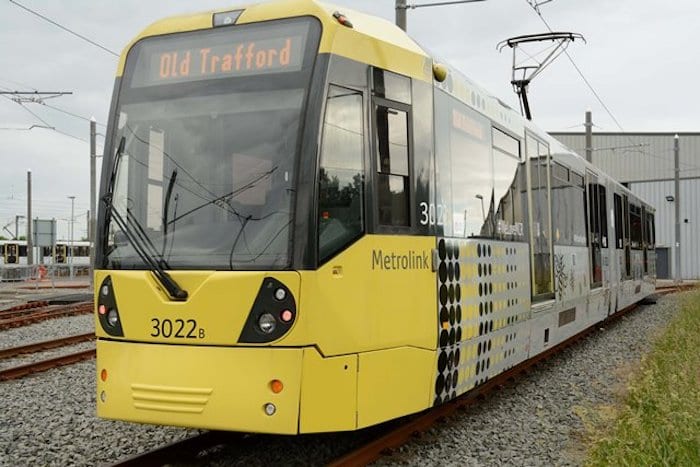Why aren’t dogs allowed on the Manchester Metrolink?
- Written by Jonny Swindlehurst
- Last updated 6 years ago
- Travel & Hotels

I made two very different trips recently. The first was flying from Ibiza to Manchester Airport. The second was from my home in south Manchester to Chorlton.
At Ibiza airport I saw at least three dogs boarding international flights. They hopped quietly into their carry cases as their owners took them on board. No one batted an eyelid.
On the trip to Chorlton, I was accompanied by my dog, Fred. I didn’t want to leave him on his own all evening. Besides, which dog doesn’t like a pint at the Horse & Jockey?
Having got off the train at East Didsbury – Fred loves the train – we headed up to the tram stop for the second leg of our journey. After buying a ticket and attempting to board I was told by a rarely spotted ticket inspector that dogs were banned from travel on the Metrolink.
Come to think of it, I’d never seen one on it. I just assumed they were allowed. Why wouldn’t they be?
Safety apparently.
We’re treading familiar ground here for Transport for Greater Manchester. Dogs have been banned since the tram’s inception in 1992. Assistance dogs are allowed of course. On the Metrolink website it says, ‘We are happy for those who require guide or hearing dogs to travel with their dog.’
So why are they so unhappy for any other canine tram travel?
This really kicked off between 2013 and 2015. After a campaign group to allow dogs to travel on Manchester trams was initiated and a Change.org petition received over 1000 signatures for the ban to be lifted, TfGM began to take note and agreed to a review in 2013.
A thorough public consultation began in 2014 with a survey of over 2,400 people conducted, both online and via passenger surveys.
According to the TfGM Committee Report for Resolution in November 2015, those who travel more regularly and at peak times were more likely to oppose changing the rules.
The figures released at the time said 43% were in favour of allowing dogs on trams on condition they were on a lead, paid a child fare, travelled off peak and weren’t on a seat. Just 28% were in favour of keeping the ban.
It wasn’t just the dog owners of Manchester who thought it an important issue. Lib Dem Councillor Iain Roberts campaigned for a trial while RSPCA bosses claimed that fewer dogs would be left at home.
In November 2015, TfGM bosses upheld the ban on safety grounds, without a trial. Councillor Andrew Fender, chair of the TfGM committee said at the time:
“This is a very emotive issue for a variety of reasons and this decision is certainly not one that has been taken lightly.
“We’ve asked for considerable evidence-based feedback from officers and listened carefully to Metrolink passengers, dog owners and assistance groups and health groups.
“While the vast majority of dog owners are responsible, there is no way to guarantee all dog owners will ensure their dogs behave appropriately and do not represent a nuisance, or worse still, a risk to passengers.”
But what about the trains and buses? Why are they different?
This was investigated by TfGM. The national policy for rail travel is that dogs are allowed on trains free of charge as long as the owner abides by certain conditions. These include a maximum of two dogs per person, on leads at all times (unless they are in a basket), and no dogs on seats. The train company can also refuse if they’re causing a nuisance or inconvenience to other passengers.
On buses, it’s at the discretion of the driver and some also charge. Stagecoach charge £1 and First Group 50p. Arriva is free.
The key argument is that the tram is a different beast. This was identified during the Risk and Hazard Assessment undertaken by TfGM. The tram is what’s termed an open network with no regular staff in the carriage during journeys or on the platform.
TfGM’s ultimate responsibility is the safety of public, staff, contractors and customers. They say they simply can’t guarantee this with the way the tram is set up.
Fender said: “Metrolink operates as a high-frequency, high-volume, unstaffed system and there is no representative on board to assess the potential risk posed by animals.”
The mode of transport which most closely resemble the tram is probably the London Underground. Transport for London allows canine travel on the Tube for all dogs ‘unless there is good reason to refuse it.’ They also insist they’re carried on escalators in stations for the dog’s safety.
As a dog owner, it seems such a shame for Manchester to be limited in this way.
The city centre has loads of dog friendly cafes and bars. Altrincham market is always packed with pooches and who would deny city-living dogs the chance to stretch their legs in Heaton Park. Not everyone in the city centre has a car.
The Metrolink is the link between the many amazing things in town and its surrounding areas. It opens up everything the city has to offer.
Should there not be an opportunity for this to be extended to everyone who calls Manchester home, regardless of how many legs they have and how much fur? But then I am biased. I view my own dog as practically human. Not everyone shares this opinion.
Currently TfGM has no plans for any further discussions on the matter but they don’t rule out looking at it again in the years to come.
Dog owners of Manchester can all but hope.
- This article was last updated 6 years ago.
- It was first published on 19 June 2017 and is subject to be updated from time to time. Please refresh or return to see the latest version.
Did we miss something? Let us know: press@ilovemanchester.com
Want to be the first to receive all the latest news stories, what’s on and events from the heart of Manchester? Sign up here.
Manchester is a successful city, but many people suffer. I Love Manchester helps raise awareness and funds to help improve the lives and prospects of people across Greater Manchester – and we can’t do it without your help. So please support us with what you can so we can continue to spread the love. Thank you in advance!
An email you’ll love. Subscribe to our newsletter to get the latest news stories delivered direct to your inbox.
Got a story worth sharing?
What’s the story? We are all ears when it comes to positive news and inspiring stories. You can send story ideas to press@ilovemanchester.com
While we can’t guarantee to publish everything, we will always consider any enquiry or idea that promotes:
- Independent new openings
- Human interest
- Not-for-profit organisations
- Community Interest Companies (CiCs) and projects
- Charities and charitable initiatives
- Affordability and offers saving people over 20%
For anything else, don’t hesitate to get in touch with us about advertorials (from £350+VAT) and advertising opportunities: advertise@ilovemanchester.com

Chorlton Library gets a stunning renovation unveiling hidden treasures

How one selfless act sparked a career dedicated to saving lives

Former sheltered housing transformed into safe haven for vulnerable youth


Manchester and Los Angeles prove that opposites really do attract

















